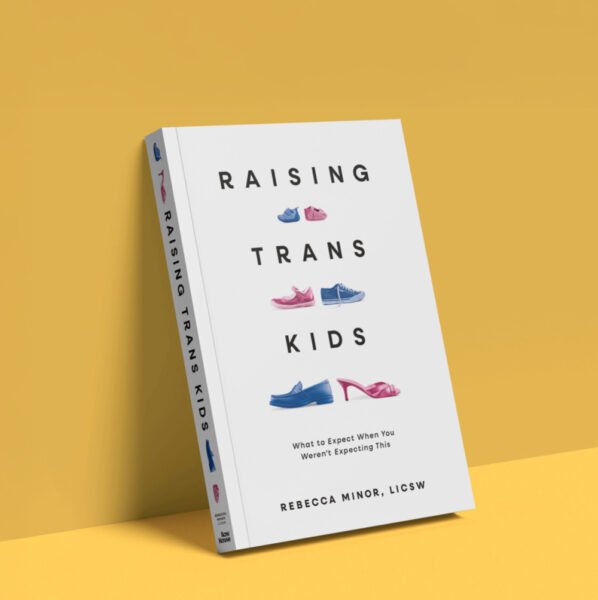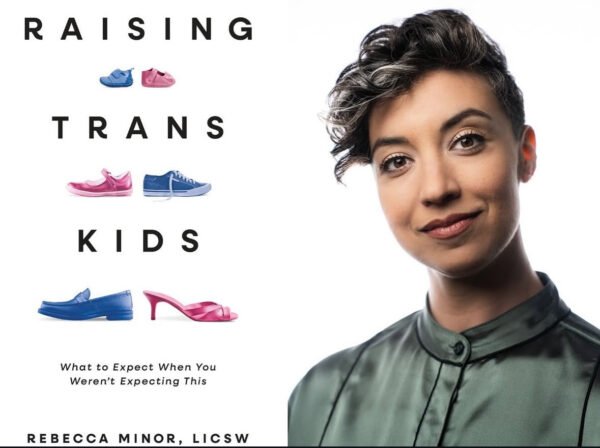HELLO HOMO,
My child came out as trans earlier this year. Our family used to be religious and conservative, but over the recent years, we left our church and have become more open; we had an idea our kid was LGBTQ+ from a young age and wanted to make sure they felt safe and loved. Now that they came out, we want to make sure we are doing all we can to help them mature and grow into their full potential. What are a few tips to help us feel more confident supporting parenting our trans child?
-Michelle, Denver CO
Hello Michelle!
Goodness, what an important question. First, I want to acknowledge how powerful it is to hear a parent of a trans child being so proactive and trans-affirming. That is a big deal! You already get a parenting gold star from me.

When I read this question, I instantly thought of Rebecca Minor (she/they). Rebecca is a gender specialist LCSW therapist who works primarily with queer and trans youth on their journey of becoming their authentic selves. In her clinical work, Rebecca helps guide the parents and families of her trans and queer clients in affirming their identities. Rebecca has a robust online community through their IG @gender.specialist and just released an incredible book, Raising Trans Kids: What to Expect When You Weren’t Expecting This.
So, Rebecca, how would you like to answer Michelle’s question?
Michelle, I love this question, and it sounds like you’ve already really laid a strong foundation by making sure that your child feels seen and loved.
As far as some kind of concrete tips to help you feel more confident, and I’m sure you may be doing some of these already, but also for OFM readers who aren’t quite there in their journey, here are some tips:
Small Affirmations Go a Long Way
It is so important to believe your child when they tell you who they are and affirm their identity daily. This includes using the name and pronouns that they’ve shared with you. With that, working on consistency is key. You know mistakes will happen, whether that’s you or extended family. Continuing to work on that and hold people accountable matters for their sense of belonging. Small affirmations go a long way.
Stay Curious
I would say staying curious and continuing your own learning, whether that’s reading books, listening to podcasts, or following trans voices online so you’re not relying on your child to be the sole teacher. It shows them that you value their identity enough to do your own work and gives you language and context to support them.
Advocate in Their World
Advocate in their world. With your child’s consent, talk with their schools, doctors, extended family, anyone in their kind of care network or community, to ensure that they’re being treated with respect. Sometimes being a parent or caregiver of a trans kid means having to gently correct others or make sure that systems like camp forms and sports things include your child fully.
That’s one way that you can show up, whether that’s for your own child, but also for any other families who might be filling out a form. Like, if you can make those edits or point out sometimes that the camp or the school that just have two boxes for gender, it can be helpful advocacy for all children and families.
Maybe even ask why they even need that information, depending on what the activity is. Creating a safe space for conversation is another huge step.
Also, just encouraging trans youth to share what they’re experiencing and really listen without rushing to fix it really helps them.

Having a cis adult lead or initiate those conversations can really normalize the experience of trans youth.
Have consistent conversations and checking in, then it doesn’t feel like such a big deal to have to come to your parents with something.
I feel like the “rushing to fix it” is a really important issue because that feels like it’s so tied to the demands of being a parent, and having to have all the answers, and fixing things. Some of these things can be fixed. Rather, there seems to be something very healing in finding ways to sit with not knowing or not having answers and meeting trans youth in that space is important.
Exactly! I think parents often feel a sense of shame when they don’t have all the answers, or they feel that they should know everything about their child’s identity, or specific terminology they need to know. The reality is, you don’t have to understand everything to love and affirm your kid.
This lends itself beautifully to a follow-up question Michelle sent in. She asked, “To what extent do you correct people about your child’s gender and pronouns and identity? Do you just correct family, friends, strangers … How far should I go?
This is another good question, and it’s a tricky one, because there isn’t an absolute, black-and-white correct answer. Every family and every situation is going to be a little bit different.
So, my advice would be to talk to your kid because they’re really the one that get to determine who gets to know this about them. Some kids really want their parents to do that correcting. And some kids will be like, “It’s too awkward for me,” or, “I just don’t want to deal with it.” So listening to how you can advocate for them is key.
Like, if it is a random person at the grocery store, or the waitress who says, “Hey ladies,” is that the context where you say, “Well, actually, my child is a boy” to someone you will probably never see that person again? Learn ahead of time from your kid.
There’s that question of what your kid is comfortable with and the capacity for emotional labor available in the moment to provide that teachable moment to a stranger.
There are some relationships where it’s important to be very clear about those boundaries, like grandparents and close family friends. Then there are some situations where they are not very important or will never see you again, and your kid doesn’t want to get into with them.
In situations where correction doesn’t happen, maybe it could be bond-building between you and your child if you are rolling your eyes together.
Exactly, Yeah.
Acknowledge it, and move through it together.
Right. Totally.
Thinking about your clinical practice, what are some negative or positive themes that you have been seeing from families reaching out to you for support in the current socio-political climate?
Most often, I think … This situation, well, certainly recently, is that parents are reaching out with a sense of fear and urgency about the kind of state of the world and current politics.
How could they not feel this way?
Exactly. But, I think what I’ve seen time and time again is that most parents and caregivers really want to do right by their kids. They feel frozen sometimes in their simple lack of information or education about this because it wasn’t something they were taught growing up, and it wasn’t in the parenting books.

Perfect pivot Rebecca! So, you wrote the book!
So, yeah! I wrote the book! Raising Trans Kids: What to Expect When You Weren’t Expecting This. I wrote this book to try to meet parents where they are. You know, we see this jump in advocacy when parents and allies are armed with some information and a sense of what to expect.
Then they don’t have to figure this all out alone. That they can show up so much more fully for their kids. This can help with parents breaking out of the, “This is just a phase they will grow out of” or, “It will pass,” which is usually grounded in a fear about safety.
Something that comes up a lot when any child that comes out as LGBTQ+, but especially as trans, are the parental expectations or “dreams” that they had from the moment that they became pregnant that they now have to grieve.
Yes.
But they have to be responsible about grieving that not with their trans child or any LGBTQ+ child.
Yes, that’s a big piece of the work, too, asking yourself, what are you actually grieving? You’re not grieving your child; you’re grieving the idea of who you thought they were going to be. That’s one that you’ve had for maybe a really long time, which … Doesn’t mean it’s not painful.
When kids come out, that reality becomes very concrete, up front, and it’s kind of like all those expectations go out the window. So it’s sort of like a reality of parenting in a nutshell.
Absolutely. I mean, many of these themes really are just realities of parenting with the volume turned up.
We could talk forever, but I have a word limit! Lol! So please give us a short synopsis of the book!
Raising Trans Kids: What to Expect When You Weren’t Expecting This is a guide for parents, caregivers, educators, really anyone who cares about youth, and not just trans youth. It is designed to meet people where they are. I know most parents don’t have the time to read a whole parenting book cover-to-cover. So, I wrote this with each chapter designed to answer a question that might keep parents up at night. It is a resource they can just flip to the thing that they’re currently most worried about and get the information that they need.
And they can buy the book by clicking this link!
I want all OFM readers to follow you on Instagram!
And you are raising money to get copies of the book to people who may not have access to it. Readers can donate to this effort through this link.
One of the hardest parts of putting this book into the world is knowing there are families and places in the most hostile legislation without access to resources, and I want them to get their hands on this book. I wrote it for the parent who might hide it under their mattress because their spouse doesn’t support their kid in that way.
Thank you Rebecca, this book is a very big deal.
Thank you!

Disclaimer: Hello Homo is for informational and educational purposes and is not a substitute for mental health treatment. Hello, Homo (Jesse Proia) is not providing mental health advice, diagnosis, or treatment to readers. If you or someone you know is experiencing a mental health crisis or emergency, please contact 911, 988 or go to the nearest emergency room.
Photo by Saami Bloom courtesy of INDIVIDUAL.studio

